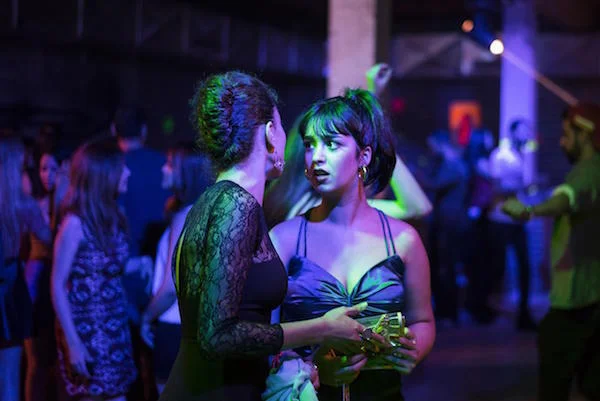Every day I’m in Cannes for the Festival I deal with an internal struggle that makes existentialist wonderings seem like a trip to the ice cream shop. Should I watch films until I drop, or spend more time at the various cocktail parties that dot the Croisette every late afternoon? Is it OK to view a film on a link while sitting at my computer, or should I make sure I get to experience each and every oeuvre on the big screen, as god intended and Cannes artistic director Thierry Frémaux insists upon? Am I allowed to choose between Jake Gyllenhaal, Tilda Swinton, Emma Thompson, Dustin Hoffman, Noah Baumbach or a Nespresso? Attend a dressed-down press screening or get dolled up for the black tie gala? Oh, the choices! It’s times like these I wish I could be cloned.
‘Tehran Taboo’ by Ali Soozandeh
When I hear the words “animated” and “Iranian” I immediately think of Marjan Satrapi’s ‘Persepolis’, which has remained throughout the years a personal highlight. But I’m about to add a new favorite to that very limited (in size, not quality) list, and it’s Ali Soozandeh’s ‘Tehran Taboo’. Yet, while both films are animated and featuring Iranian stories, they couldn’t be further from each other in themes and story.
‘Tehran Taboo’ delves deep into the underbelly of Iranian society, a place where religious judges keep prostitutes on the side and put them up in bourgeois apartments and these same women give men blow jobs in taxis, while their children look on. If you wonder why make such a film in animation, then ponder this: How would an Iranian filmmaker ever be allowed to shoot (imagine the scene at the permits’ office) such ideas in real life Tehran? An impossibility, one that through the magic of cinema becomes possible.
The film is raw, dark, beautifully illustrated and deeply disturbing and yet it offers one of the most authentic insight into a world the media has pushed into a dark corner. ‘Tehran Taboo’ brings it back to the forefront and along the way proves that in the end — be it Italy and its Catholic influence, the US and its Puritanical vein, or Iran and Islam — religion messes us all up in the same way, everywhere in the world.
‘Beauty and the Dogs’ by Kaouther Ben Hania
Mariam Al Ferjani in ‘Beauty and the Dogs’
At the center of Kaouther Ben Hania’s film in this year’s Un Certain Regard section is an actress who deserves a thousand applauses — Mariam Al Ferjani. It’s almost impossible to believe that she’s a newcomer as she truly channels great movie stars and powerful actresses from all the world and from times gone by. In the lead role of Mariam, opposite Ghanem Zrelli as Youssef, she begins as an enthusiastic young girl on a night out with friends, travels through the worst hell imaginable for a woman, and comes out a super heroine at the end, complete with a veil tied as a cape.
Ben Hania is a filmmaker to watch. While I am still on the fence about her film, one of the few I have contrasting ideas and conflicting emotions about, I find her voice powerful and interesting. ‘Beauty and the Dogs’ was just acquired by Oscilloscope for release in the US within the year so people there will be able to make up their minds for themselves. But most of my doubts about it lie with its story, one where yet another woman in the Arab world is portrayed as a victim of men. It’s a concept too often discussed in the Western media and one that in my humble opinion, perpetuates the stereotypes already present in our society. A society that misunderstands and misinterprets the MENA region completely. Already.
‘The Meyerowitz Stories (New and Selected)’ by Noah Baumbach
Beyond its quintessentially New York artist story, the genius of Noah Baumbach and the beauty of watching an ensemble cast which includes Dustin Hoffman, Emma Thompson, Ben Stiller and Adam Sandler, ‘The Meyerowitz Stories’ is a perfect portrait of a family in an interior — and exteriors. At the center of it is patriarch Harold Meyerowitz (Dustin Hoffman), “the Dad” and he’s surrounded by his children from various marriages (Adam Sandler, Ben Stiller and Elizabeth Marvel), as well as his latest wife, drunk-but-won’t-admit-it Maureen (Emma Thompson) whose cooking and driving skills leave something to be desired.
Forget the fact that Harold is the male equivalent of my own mother and there is a scene in a restaurant, involving a bottle of ketchup, a jacket and a couple of French tourists that seemed taken straight out of my life; forget the fact that I have a girl crush and always have had it on Emma Thompson. Forget all that, because beyond my own connection to this funny, perfectly written film with the most delightfully rhythmic dialogue, believe me when I say lies a most wonderful movie. A rare gem of gentle humor and poignant drama, a masterpiece that found me laughing one minute and tearing up the next.
Even the press junket for the film, screening in Competition this year at Cannes, was moving, with Emma Thompson pointing out how we as a society are abusing the younger generations by allowing them to grow up glued to their electronic devices. More on that in the complete interviews to come.
As a last thought, I’ll admit that I’ve listened to both sides of the Netflix controversy — and is it even that anymore? I mean, hasn’t it been proven that the streaming company is helping to make and distribute films that we would otherwise never get to watch? And isn’t that the most fantastic news, the best incentive, the most wonderful way to help the world discover films that will change us for the better? I think you know my answer...


